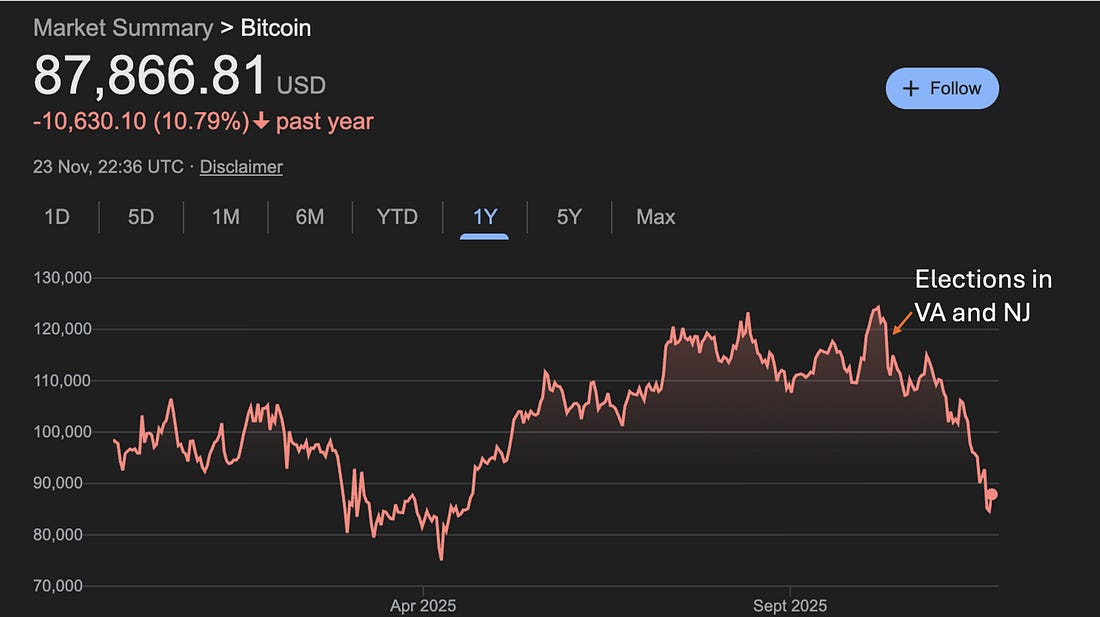What is Bitcoin good for? It isn’t money — that is, it isn’t a medium of exchange, something you can use to make payments. It isn’t a hedge against inflation. It isn’t a hedge against financial risks — on the contrary, the price of Bitcoin has generally moved in the same direction as the AI-related stocks driving the stock market these days, but with even greater volatility. To the extent that Bitcoin has a use case, it is covering your financial tracks: crypto facilitates anonymous transactions that don’t leave a paper trail. Such transactions aren’t necessarily criminal, but many are. By the way, anonymity doesn’t just enable crime by crypto users, it also enables crime against them. If you possess a Bitcoin’s key, the code that unlocks it, it’s yours, no matter who you are and how you got it. In that sense, getting your hands on a Bitcoin key is similar to getting your hands on a bag full of $100 bills. This feature has led to a wave of abductions of major crypto investors by criminals demanding their keys. Indeed, such abductions have become so common that a major recent Bitcoin conference included a daylong “counter-kidnapping” workshop, in which participants learned, among other things, how to gnaw their way through zipties. In addition to facilitating crime, Bitcoin has increasingly become an engine of predation. Crypto — or, worse, shares in companies that buy crypto with borrowed money — is heavily sold to naïve investors who don’t realize what they’re getting into. They do well when Bitcoin’s price is rising, but many probably don’t understand how badly they can suffer when it falls. And crypto has fallen a lot recently. Bitcoin has actually held up better than smaller, more obscure coins, but even so it’s down roughly 25 percent since late October. It’s possible that Bitcoin will bounce back, because it’s more than an asset, it’s a cult. When I spoke with Hasan Minhaj and Bitcoin came up, his immediate reaction to my criticism was “I don’t want to get memed, the Bitcoin boys have already come after me.” This cult status has allowed Bitcoin to recover from setbacks and scandals that would have sunk any normal investment, because true believers respond to any drop in its price by piling in more than ever. And maybe that will happen again. But maybe not, because at this point Bitcoin is largely a Trump trade. Bitcoin’s price surged after Donald Trump won last year, and its recent plunge coincides with a series of Trump political setbacks. Why is Bitcoin a Trump trade? Partly because Trump, whose family has in effect received massive bribes from the crypto industry, has been rewarding that investment with pro-crypto policies. Notably, Trump has signed an executive order intended to allow ordinary Americans — who, again, generally don’t know what they’re getting into — to invest money from their 401(k)s in crypto assets. More broadly, crypto is, as I’ve suggested, increasingly a tool for financial predators, and the Trump administration is extremely predator-friendly. Ask Changpeng Zhao, founder of the cryptocurrency exchange Binance, who was found guilty of violating U.S. money-laundering laws — then pardoned by Trump. The administration has been doing all it can to dismantle institutions, like the Consumer Financial Protection Bureau, that were created to help keep investors and markets safe after the 2008 financial crisis. Scott Bessent, the Treasury secretary, and other Trump officials and allies — including some officials at the Federal Reserve — have also been doing all they can to undermine bank supervision, which tries to limit the kind of risk-taking that brought on the 2008 crisis. All of this is bad for small investors and bad for financial stability. But it’s good for financial schemers like the people and institutions promoting Bitcoin. So how should we understand Bitcoin’s recent crash? Think of it as the unraveling of the Trump trade. Trump remains as determined as ever to reward the industry that made his family rich, and those around him are as determined as ever to make America safe for predators of all kinds. But Trump’s power is visibly diminishing, so the price of Bitcoin, which has in effect become a bet on Trumpism, has plunged. Why is Trump suddenly looking weaker? Polls have given him very low marks since the spring, but his net approval has declined significantly over the past month. And while Trump just claimed that he has THE HIGHEST POLL NUMBERS OF MY “POLITICAL CAREER” — nobody knows what poll, if any, he’s referring to — most doubts about the validity of polls showing his extreme unpopularity were dispelled by blowout Democratic victories in Virginia and New Jersey on Nov. 4. These electoral defeats have shaken the willingness of Republicans in Congress to keep showing lockstep obedience to Trump. At the same time, the growing furor over Trump’s ties to Jeffrey Epstein has rattled the MAGA base. Many political analysts, I suspect, don’t fully appreciate the extent to which many members of that base truly believed that Trump was protecting the world against Democratic pedophiles, and the degree to which they have been shaken by the growing realization that they may have gotten their heroes and villains mixed up. Is it a stretch to link Trump’s political woes to the price of crypto? No. As Josh Marshall often emphasizes, power is unitary. A weakened Trump is less able to work his will on all fronts, including his efforts to promote crypto. I’ll talk more about the politics/crypto linkage in future posts. For now, let me just reiterate that Bitcoin has become a Trump trade, and Bitcoin’s declining price is an indicator of Trump’s declining dominance over the G.O.P.. |

